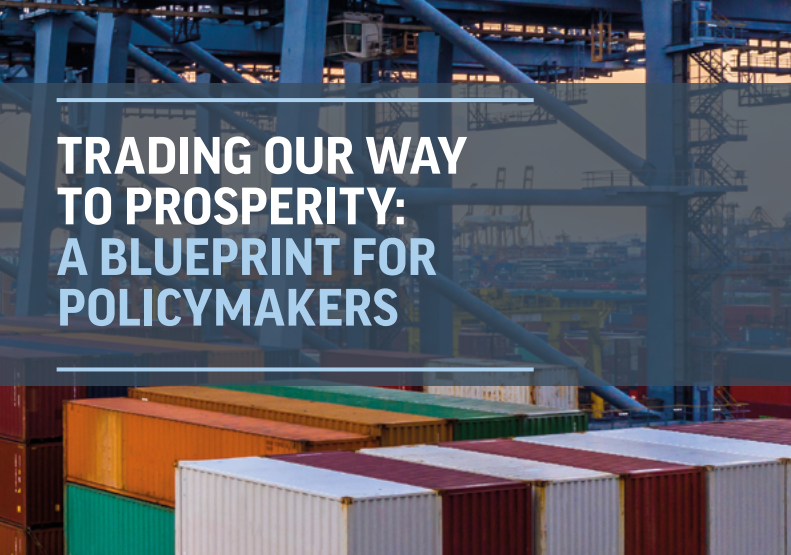Landmark new trade policy platform recommends ‘OBR for Trade’ and beneficial alignment
The UK Trade and Business Commission has published a comprehensive assessment of the state of UK trade containing 114 recommendations to remove barriers to growth and prepare the UK economy for the challenges and opportunities of the next decade.
Trading our way to prosperity: A blueprint for policymakers from the cross party group of MPs and Business leaders comes amid alarming economic forecasts and unprecedented warnings from industry about the potential for further economic decline, lost jobs and falling living standards in the UK.
The proposals cut across all sectors of the economy and key recommendations include:
A UK Board of Trade: An independent government agency to act for the Department for Trade and Business as the OBR does for the Treasury, ensuring that trade policy is independently assessed.
Beneficial alignment: Boost UK economic growth by maintaining regulatory alignment with the EU where beneficial; outside of the Single Market and Customs Union. Achieved through a new ‘UK-EU Regulatory Cooperation Council’
A visa system that works for Britain: Ease the labour shortages through reform of temporary and business visas, a new Youth Mobility Visa scheme with the EU and increased flexibility for artists and seasonal workers
Taking back control of trade: Subject all new trade agreements to full parliamentary scrutiny and approval of both Houses of Parliament.
The recommendations have been informed by the largest post-Brexit consultation on trade involving 80 hours of testimony from 234 expert witnesses, industry leaders and business owners as well as written evidence from more than 200 organisations including the National Farmers Union, Tech UK, Ernst and Young, the Welsh Government and the RSPCA.
New polling from Best for Britain suggests widespread support for the proposals. The representative poll of 10,102 people by Focaldata shows that 53% of people asked said the UK should pursue closer ties with the EU. Most Brits (51%) favour increasing the availability of UK visas particularly for sectors experiencing labour shortages and 52% believe that the UK would be better to align with our largest trading partners with only 35% preferring divergence. In more than 99% of GB constituencies, alignment is the most popular opinion.
The policy platform will be discussed at Trade Unlocked 2023, a major new conference at the NEC in Birmingham on Tuesday 20th June where businesses of all sizes, from all parts of the economy will meet with the goal of influencing election manifestos on trade policy before the next election.
Hilary Benn MP, co-convenor of the UK Trade and Business Commission, said:
“These recommendations draw on two years of gathering evidence from businesses on everything from the impact on manufacturing and agriculture of our new trading arrangements with the EU to how we can ensure that we have the skills we need for the future.
“Growth is a priority for both the Government and opposition, and this report provides a menu of things that could be done to help our firms to grow and prosper. It’s now time to listen to business about what needs to be done to fix the problems that we can all clearly see.”
Former Siemens UK Chief Executive Juergen Maier said,
“UK businesses have never faced a more challenging trading environment and especially SMEs, from almost every part of the economy, need an urgent, pragmatic and meaningful intervention.
“The EU is the UK’s largest trading partner and a key driver in setting standards globally, so ending dogmatic divergence and replacing it with regulatory alignment where beneficial along with a new cooperation body to facilitate it really is a no-brainer. This opportunity is now neatly wrapped up in a bow in this report for policy makers to adopt.”
Founder of The Good Life, a sustainable grocery store with two branches around Stockport, Shelley Brown said:
“Alongside significant global factors, the British economy and particularly small businesses like mine face immense additional pressure of new trading arrangements which have added costs and red tape while reducing opportunities and investment. For too many SMEs it has meant shutting up shop for good.
“These evidence-based proposals represent concrete ways for policy makers to not only remove obstacles to growth, but to help us seize future opportunities.”

